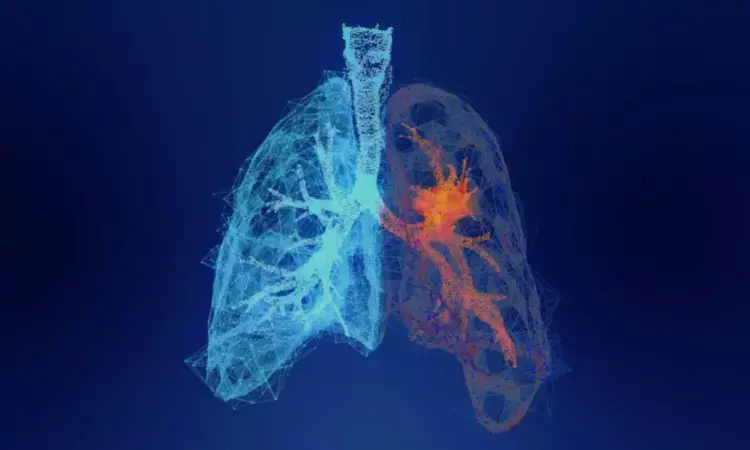- Home
- Medical news & Guidelines
- Anesthesiology
- Cardiology and CTVS
- Critical Care
- Dentistry
- Dermatology
- Diabetes and Endocrinology
- ENT
- Gastroenterology
- Medicine
- Nephrology
- Neurology
- Obstretics-Gynaecology
- Oncology
- Ophthalmology
- Orthopaedics
- Pediatrics-Neonatology
- Psychiatry
- Pulmonology
- Radiology
- Surgery
- Urology
- Laboratory Medicine
- Diet
- Nursing
- Paramedical
- Physiotherapy
- Health news
- Fact Check
- Bone Health Fact Check
- Brain Health Fact Check
- Cancer Related Fact Check
- Child Care Fact Check
- Dental and oral health fact check
- Diabetes and metabolic health fact check
- Diet and Nutrition Fact Check
- Eye and ENT Care Fact Check
- Fitness fact check
- Gut health fact check
- Heart health fact check
- Kidney health fact check
- Medical education fact check
- Men's health fact check
- Respiratory fact check
- Skin and hair care fact check
- Vaccine and Immunization fact check
- Women's health fact check
- AYUSH
- State News
- Andaman and Nicobar Islands
- Andhra Pradesh
- Arunachal Pradesh
- Assam
- Bihar
- Chandigarh
- Chattisgarh
- Dadra and Nagar Haveli
- Daman and Diu
- Delhi
- Goa
- Gujarat
- Haryana
- Himachal Pradesh
- Jammu & Kashmir
- Jharkhand
- Karnataka
- Kerala
- Ladakh
- Lakshadweep
- Madhya Pradesh
- Maharashtra
- Manipur
- Meghalaya
- Mizoram
- Nagaland
- Odisha
- Puducherry
- Punjab
- Rajasthan
- Sikkim
- Tamil Nadu
- Telangana
- Tripura
- Uttar Pradesh
- Uttrakhand
- West Bengal
- Medical Education
- Industry
Radiation Dose to Cardiac Substructures linked with Different Arrhythmias in Lung Cancer Patients: Study

USA: A recent study published in JACC: CardioOncology reveals that in patients with locally advanced non-small cell lung cancer, the dose of radiotherapy delivered to specific cardiac substructures is linked to different types of arrhythmias. The research highlights how targeted radiotherapy, while effective against cancer, can have distinct and potentially serious impacts on heart health.
The study focused on how different doses of radiation to specific heart parts are associated with pathophysiologically distinct classes of arrhythmias.
The researchers identified different arrhythmias linked to radiation doses delivered to specific cardiac substructures. They found that radiation to the pulmonary veins (PVs) was associated with atrial fibrillation (AF) and supraventricular tachyarrhythmia (SVT). In contrast, radiation to the left circumflex coronary artery was connected to atrial flutter. Additionally, radiation targeting the right coronary artery was linked to bradyarrhythmias, and radiation to the left main coronary artery was associated with ventricular tachyarrhythmia (VT) and asystole.
Arrhythmias frequently occur after radiotherapy for non-small cell lung cancer. Katelyn M. Atkins, Department of Cardiology, Cedars-Sinai Medical Center, Los Angeles, California, USA, and colleagues aimed to examine the relationship between different types of arrhythmias and the radiation dose administered to specific cardiac substructures.
For this purpose, the research team performed a retrospective study involving 748 patients with locally advanced non-small cell lung cancer who underwent radiotherapy. The study calculated dose parameters for various cardiac substructures and used receiver-operating characteristic curve analyses to identify predictors for severe atrial fibrillation, atrial flutter, non-AF and non-atrial flutter supraventricular tachyarrhythmia, bradyarrhythmia, and ventricular tachyarrhythmia or asystole. Additionally, Fine-Gray regression models were utilized to account for noncardiac death as a competing risk.
The study led to the following findings:
- Of 748 patients, 17.1% experienced at least 1 grade ≥3 arrhythmia, with a median time to first arrhythmia of 2.0 years.
- The 2-year cumulative incidences of each arrhythmia group were 8.0% for AF, 2.7% for atrial flutter, 1.8% for other SVT, 1.4% for bradyarrhythmia, and 1.1% for VT or asystole.
- Adjusting for baseline cardiovascular risk, pulmonary vein (PV) volume receiving 5 Gy was associated with AF (subdistribution HR [sHR]: 1.04/mL), left circumflex coronary artery volume receiving 35 Gy with atrial flutter (sHR: 1.10/mL), PV volume receiving 55 Gy with SVT (sHR: 1.03 per 1%), right coronary artery volume receiving 25 Gy with bradyarrhythmia (sHR: 1.14/mL), and left main coronary artery volume receiving 5 Gy with VT or asystole (sHR: 2.45/mL).
"These findings emphasize the need for ongoing refinement of cardiac substructure dose limits, taking into account the physiological and pathophysiological mechanisms of cardiac disease," the researchers concluded.
Reference:
Atkins, K. M., Zhang, S. C., Kehayias, C., Guthier, C., He, J., Gasho, J. O., Bakhtiar, M., Silos, K. D., Kozono, D. E., Zei, P. C., Nohria, A., Nikolova, A. P., & Mak, R. H. (2024). Cardiac Substructure Radiation Dose and Associations With Tachyarrhythmia and Bradyarrhythmia After Lung Cancer Radiotherapy. JACC: CardioOncology, 6(4), 544-556. https://doi.org/10.1016/j.jaccao.2024.07.005
Dr Kamal Kant Kohli-MBBS, DTCD- a chest specialist with more than 30 years of practice and a flair for writing clinical articles, Dr Kamal Kant Kohli joined Medical Dialogues as a Chief Editor of Medical News. Besides writing articles, as an editor, he proofreads and verifies all the medical content published on Medical Dialogues including those coming from journals, studies,medical conferences,guidelines etc. Email: drkohli@medicaldialogues.in. Contact no. 011-43720751


